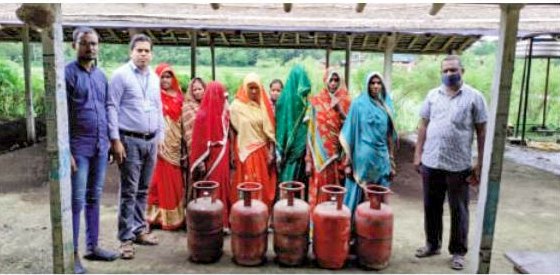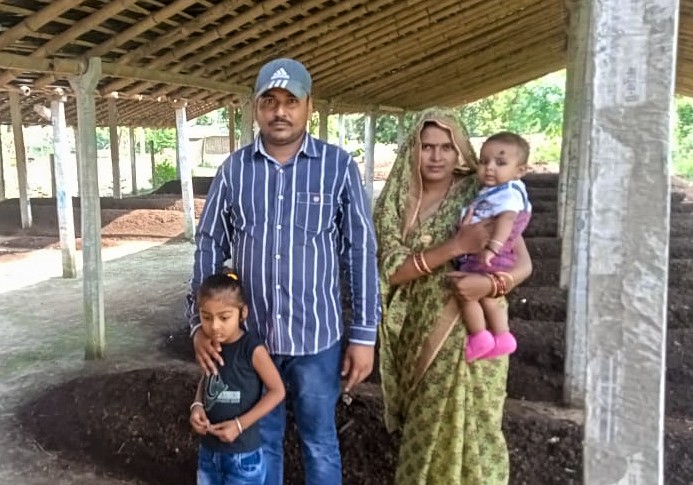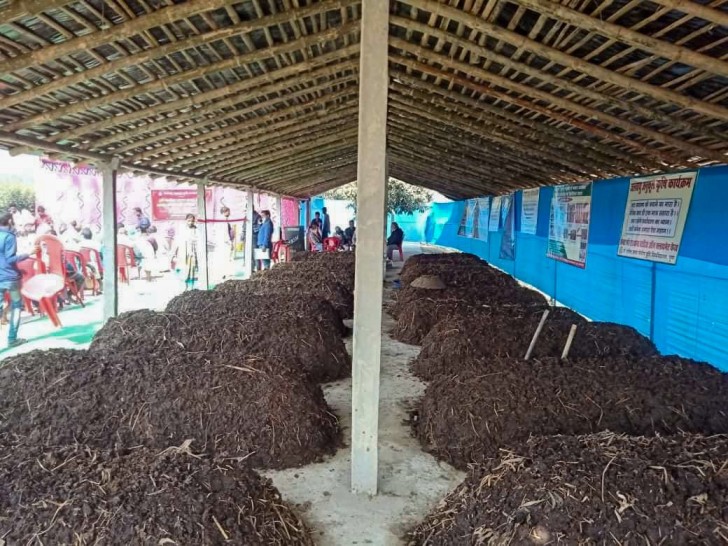Preparing meals for a six-member family on a chulha fed by wood, crop waste and cattle dung exposed Munni Devi (42) to the noxious smoke that occasionally made her sick. But that was months ago. Today, she is a proud participant of a unique ‘waste-to-gas’ initiative.
The initiative’s catchy slogan, “Gobar deebo, gas leebo” in Maithili—a language spoken in Bihar’s Madhubani district, which means: “Give us cow dung, take back a gas cylinder”—is rallying inhabitants of Sukhet gram panchayat. In the process, it is also ushering in cleaner surroundings and empowering housewives too.
In February 2021, Samastipur-based Dr Rajendra Prasad Agricultural University (RPAU) selected Sukhet gram panchayat (in Jhanjharpur block) under its Climate Vigilant Agriculture programme and introduced locals to the technology of making vermicompost from household garbage and cattle dung provided by the residents. In return, each household would receive a free refill of a cooking gas cylinder.
The Sukhet project is the brainchild of Dr Ramesh Chandra Srivastava, vice-chancellor RPAU, a vermicompost evangelist who is on a mission to popularise it among various institutions and the farming community in the state.
Among his projects, the vermicompost unit in the university premises earns Rs 15 lakhs annually.

He has initiated similar units in the ancient Baba Baidyanath Dham Temple, Deoghar and Mujaffarpur’s 3-century-old Baba Garibnath Temple.
But the gram panchayat comprising Sukhet, Godhanpur and Machidih witnessed large-scale flooding in the past — the recent being in the year 2019 which destroyed houses, flooded fields and uprooted families when river Kamala breached its banks. Several families spent a couple of months living on the roads, memories of which are still sharp among the villagers
Though the PM Ujjawala Yojana launched in 2016, to provide free LPG connections to women below have reached 80 million families, the refilling has remained poor ranging from 26 to 70% across different states. Incidentally, increasing LPG prices have discouraged households from getting new refills.
“Before beginning work in Sukhet, we undertook a survey in the villages and found that though most households had LPG cylinders they were unable to afford refills and ended up using goitha (sun-dried dung cakes), twigs and branches as jalawan (firewood),” informs Dr Shankar Jha, assistant professor, soil sciences, RPAU.
In order to address this grim scenario, RPAU authorities came up with a unique and sustainable solution to achieve rural sanitation through a door-to-door collection of household waste; making economic utilization of agro-waste; monetizing cattle dung to pay for the LPG refill and in doing so create job opportunities at the village itself.
The university has built a bamboo-roofed vermicompost yard with concrete floors on a plot of land provided by Machidih resident Sunil Jadhav (42).

Additionally, he has been given earthworms and dustbins-loaded bicycle carts to collect the waste. Each morning two local youths visit households to collect wet garbage and cattle dung and bring it to the yard for processing. “During our trips, we educate the households about our initiative to collect things like vegetable peels, leftover food and cattle dung. We say no to plastics of any kind, glass bottles etc,” informs Jadhav, who discontinued his studies to become an agri-prenuer and tend to his family plot. He adds, “After every two months, households which have attained the target of 1,200kg of waste can avail of a free LPG refill.”
Considering he owns five bighas (100 katthas), Jadhav is better off than others — for most farmers here own an average of only 10 kathas (around 13,600sq.ft) of land on which they grow paddy, wheat and pulses.
So far Jadhav’s unit has manufactured 25,000 kgs of vermicompost and distributed 44 LPG cylinders. The majority of the families own buffaloes here with a handful keeping cows.
The All-Purpose Vermicompost

Besides farmers buying vermicompost to fertilize their crops, hatcheries are sourcing it too.
Hatchery owner Rahul Mahato (32) of the village, Berma,1 km from Machidih, says, “Earlier, we used cow dung and superphosphate in our pokhar (pond) but now I am using vermicompost which thickens the water that has benefitted my hatchery immensely.”
What Mahato means by ‘thickens the water’ is that vermicompost being a decomposed matter, unlike cattle dung, enhances the growth of phytoplankton or the microalgae, leading to a good harvest of fish.
Proud of the garbage-to-compost-to-cylinder initiative as it has ushered in cleaner surroundings and reduced the use of wood-fired stoves in several households, Sukhet gram pramukh Renu Devi (32) says, “Presently, we have 50 families of Machidih depositing their waste. In the coming months, we will include those from Sukhet and Godhanpur, too, thus bringing all the 2,500 households of the gram panchayat under the project. Several farmers have started using jaivik khad (organic fertiliser), which we consider as an achievement.”
Sukhet has generated a lot of interest in the district, and so far over 400 farmers have visited the vermicompost unit, all mobilised by the local KVK (Krishi Vigyan Kendra). “Farmers have evinced interest because they have realised that even crop residues and water hyacinth which have taken over water bodies too can be used to make compost,” says Dr Sudhir Das, senior scientist, KVK.
Dr Srivasatva says, “If the Sukhet Model is scaled to the entire state vermicompost generated would be about 50 million tonnes annually, which would save a huge amount of chemical fertilisers — about 1.67 million tonnes of urea nitrogen, 2.5 million tonnes of single superphosphate (SSP) and 0.72 million tonnes of muriate of potash.”
With 15.3 million cattle heads in Bihar, vermicompost holds a lot of promise for the state. Dr Srivastava is of the opinion that as the state government subsidises organic farming a part of it could be channelised through the purchase of vermicompost from units like the Sukhet project. “In Bihar, the government gives Rs 11,500 cash subsidy per acre for organic farming in the organic corridor along the river Ganges. Going by this estimate, one can realise the potential units such as these holds,” he concludes.
Today it’s just 50 women who have said no to chullah, leaving memories of black clouds behind. But with every month, more women are realising the importance of smokeless kitchens in their daily lives.
(Edited by Yoshita Rao)
No comments:
Post a Comment